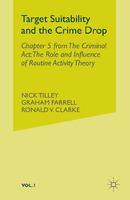Target Suitability and the Crime Drop
Chapter 5 from The Criminal Act: The Role and Influence of Routine Activity Theory
Author(s)
Tilley, N.
Farrell, G.
Clarke, R.
Maguire, John D
Language
EnglishAbstract
This is a chapter from The Criminal Act: The Role and Influence of Routine Activity Theory edited by Martin A. Andresen and Graham Farrell. This chapter is available open access under a CC BY license. Target suitability is a cornerstone of Marcus Felson's routine activities approach, and critical in determining crime rates. Recent research identifies reduced target suitability, via improved security, as central to the 'crime drop' experienced in many countries. Studies in different countries show car theft fell with far more and better vehicle security. Yet increases in household security were more modest and do not track burglary's decrease as well. In this chapter, the authors explain that apparent anomaly as due more to an improvement in the quality of household security leading to reduced burglary. It is further suggested that improvements to home insulation in the UK that brought double glazing may have, somewhat inadvertently, introduced better frames and locks for doors and windows, that in turn reduced household burglary.; This is a chapter from The Criminal Act: The Role and Influence of Routine Activity Theory edited by Martin A. Andresen and Graham Farrell. This chapter is available open access under a CC BY license. Target suitability is a cornerstone of Marcus Felson's routine activities approach, and critical in determining crime rates. Recent research identifies reduced target suitability, via improved security, as central to the 'crime drop' experienced in many countries. Studies in different countries show car theft fell with far more and better vehicle security. Yet increases in household security were more modest and do not track burglary's decrease as well. In this chapter, the authors explain that apparent anomaly as due more to an improvement in the quality of household security leading to reduced burglary. It is further suggested that improvements to home insulation in the UK that brought double glazing may have, somewhat inadvertently, introduced better frames and locks for doors and windows, that in turn reduced household burglary.
Keywords
Criminology; Public safetyDOI
10.1007/978-1-137-52502-4ISBN
9781349707058;9781137525017;9781349995905Publisher
Springer NaturePublisher website
https://www.springernature.com/gp/products/booksPublication date and place
London, 2015Classification
Crime and criminology


 Download
Download Web Shop
Web Shop